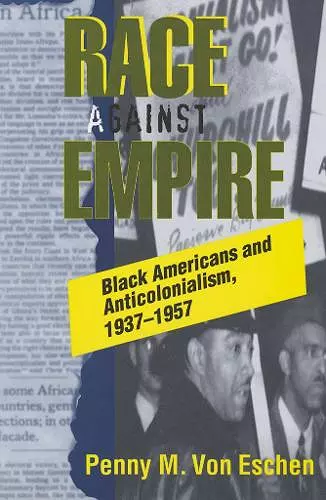Race Against Empire
Black Americans and Anticolonialism, 1937–1957
Format:Paperback
Publisher:Cornell University Press
Published:3rd Apr '97
Currently unavailable, and unfortunately no date known when it will be back

Marshaling evidence from a wide array of international sources, including the black presses of the time, Penny M. Von Eschen offers a vivid portrayal of the African diaspora in its international heyday, from the 1945 Manchester Pan-African Congress to early cooperation with the United Nations. Tracing the relationship between transformations in anti-colonial politics and the history of the United States during its emergence as the dominant world power, she challenges bipolar Cold War paradigms. She documents the efforts of African-American political leaders, intellectuals, and journalists who forcefully promoted anti-colonial politics and critiqued U.S. foreign policy.
The eclipse of anti-colonial politics—which Von Eschen traces through African-American responses to the early Cold War, U.S. government prosecution of black American anti-colonial activists, and State Department initiatives in Africa—marked a change in the very meaning of race and racism in America from historical and international issues to psychological and domestic ones. She concludes that the collision of anti-colonialism with Cold War liberalism illuminates conflicts central to the reshaping of America; the definition of political, economic, and civil rights; and the question of who, in America and across the globe, is to have access to these rights.
Race against Empire... breaks much ground in current historiography on cold war and anti-colonial practices.... it is useful for its analysis of America's cold war policies, how these policies affected black political movements in the international sphere, and how, ultimately, this led to the collapse of the prominent opponents of colonialism and significant challenges to US foreign policy abroad. But Race against Empire is also important because it identifies a little-known constellation of intellectuals who, through creative and energetic insurgency in the context of cold war repressions, articulated the links necessary for building a movement of international solidarity among all oppressed peoples.
(Race and Class)Although her central arguments are straightforward, they have a deep historical grounding. She gives attentionto the many long- and short-term conditions influencing the form and content of a diasporan identity in the 1940's.... On the whole, Von Eschen paints a riveting portrait of a time in which radical anticolonialism and domestic Black civil rights marched hand in hand, before weathering the challenges of the Truman and Eisenhower years.
(Against the Current)Scholars of race, social movements, political science, or the mass media will find great value in this unsentimental account of a disturbing history.
(Contemporary Sociology)This story of the potential—and the obstacles—in building a solidarity movement across national boundaries retains its full relevance in today's world, even as it reveals an important chapter in the history of both African Americans and of the U.S. left.
(Monthly Rev- Winner of •Winner, 1998 Stuart L. Bernath Book Prize (Societ.
ISBN: 9780801482922
Dimensions: unknown
Weight: 454g
288 pages